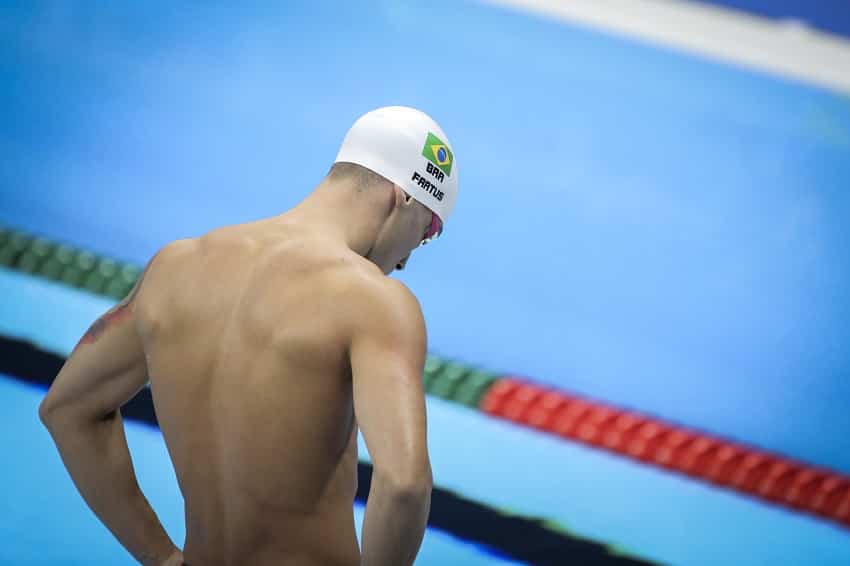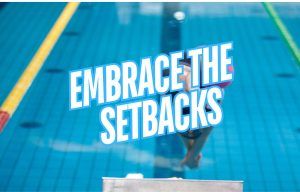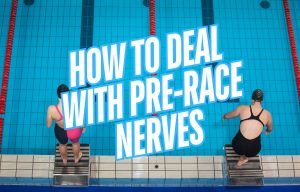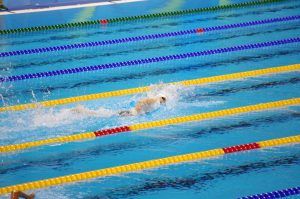
6 Benefits of Visualization for Swimmers
Wondering what visualization can do for your swimming? Here are some evidence-based benefits of visualization for swimmers for more confidence, less choking, and even better technique.

There is no shortage of material, tips, and “hacks” for swimming faster.
Google “how to swim faster” and you are going to get over 66,000,000 results. (!!!)
Technique, dryland, sets—there is so much stuff out there that you are going to be neck-deep in tips faster than you can say, “Get out swim!”
Most of the traffic that comes to my website is a variation of the “how-to” searches:
And so on.
But the thing that is missing from all of this information is quite literally half the thing you need to perform your best…
Swimmers are on a merciless hunt for improvement in performance…
But usually only when it comes to the physical half of their swimming.
The other half, what’s happening under your cap and between the ears, is the missing part of most swimmer’s preparation.
After all, you can work your tail off for months on end at practice, you can buy the fanciest of fancy tech suits, but if you crumble under pressure and “choke,” all that hard work feels like it was for nothing.
Being confident, mentally tough, and mentally prepared on race day is a choice that is made ahead of time.
Yup, some swimmers definitely “have it” when it comes to racing with a killer instinct.
But even the greats work at making their mindset even stronger:
So yes—a high-performance mindset isn’t something you are born with, it’s something you gotta work at!
Even for the fastest swimmers on the planet.
The ability to properly channel your energy on race day in the most productive way possible doesn’t need to be this big mystery.
Hoping to perform well on race day isn’t a strategy.
At least, not a strategy that will produce consistent results.
Forget the yo-yo and prepare mentally with the same gusto and commitment that you prepare physically.
The good news is that being mentally prepared doesn’t require a metric butt-ton of time and energy.
I know that swim practice is hard. All the meters and yards and threshold sets are not easy. No doubt about that.
But the mental toughness needed to crush a 7,000m distance practice isn’t the same as the mental toughness you need to conquer pressure on race day.
There are countless swimmers among us who thrive in the psychologically safe confines of practice, but crumble mentally on race day.
You know the swimmer…
They can put up near-PB’s at the end of a 50,000m week of training, but when fully rested and tapered, struggle to knock a tenth of a second off their best time.
This result is wildly infuriating and discouraging for the swimmer who works their tail off at practice.
(And let’s be honest, they deserve a better result than they are getting!)
Often the reason is that there is a serious mismatch in the amount of pressure they experience in training versus the pressure they experience in competition.
If this sounds like you, it’s time to get serious about asking yourself how much pressure you are experiencing in training.
How closely are you ratcheting up the intensity and pressure in practice so that the pressure and intensity of competition isn’t so performance-crushing?
Here are some simple ways you can turn up the pressure when there is no pressure:
The performance you want in competition starts in practice.
And not just technique, or stroke rate, or even the pace you want to hold on race day.
But the mindset you have on race day is carved out in training.
Make the decision to train with a mindset of high-performance.
And this means more regularly bringing that competitive mindset to the pool with you on those dark early mornings, at the tail-end of a big week of training, and when you are feeling sluggish and tired halfway through the main set.

Olivier Poirier-Leroy Olivier Poirier-Leroy is the founder of YourSwimLog.com. He is an author, former national level swimmer, two-time Olympic Trials qualifier, and swim coach.
✅ Free shipping on Orders over $49
✅ Price Match Guarantee
✅ Best selection of gear for training and competition
✅ Fast and Easy Returns

“This is the best book I have ever seen concerning mental training.” — Ray Benecki, Head Coach, The FISH Swim Team


Wondering what visualization can do for your swimming? Here are some evidence-based benefits of visualization for swimmers for more confidence, less choking, and even better technique.

Ready to uncork some best times at your next swim meet? Here’s what you need to know to prepare for a swim meet.

The right mental skills can help you unlock faster swimming on race day. Here is a look at the right skills to use for competition.

Frustrated with setbacks in the pool? Here are some tips for improving your ability to embrace setbacks and swim faster.

Struggling to swim fast under pressure? Here are some tips for how to manage pre-race nerves on race day.

Swimmers often find themselves stuck with doubt when it comes to doing tough things in the water. Here’s a simple question to ask when you find doubt and uncertainty stopping you from excellence.
SITE
SHOP
GUIDES

LANE 6 PUBLISHING LLC © 2012-2025
Join 33,000+ swimmers and swim coaches learning what it takes to swim faster.
Technique tips, training research, mental training skills, and lessons and advice from the best swimmers and coaches on the planet.
No Spam, Ever. Unsubscribe anytime.
